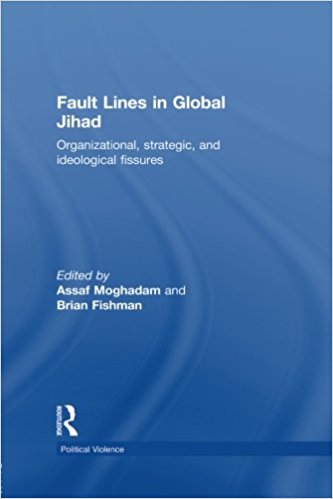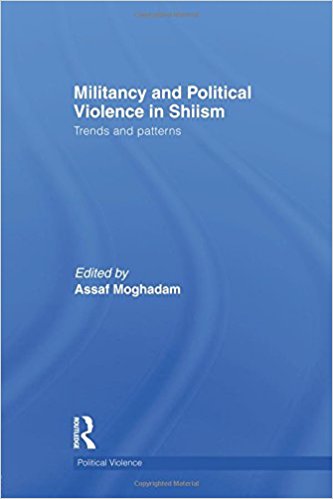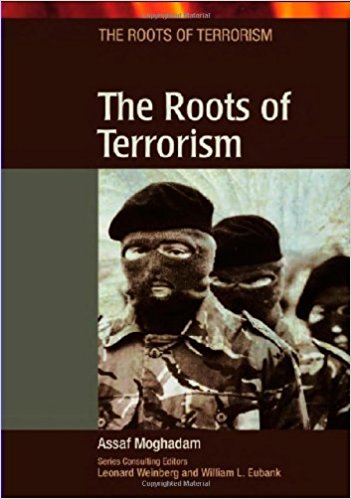Books
Nexus of Global Jihad
Nexus of Global Jihad: Understanding Cooperation among Terrorist Actors.
Fault Lines in Global Jihad
Fault Lines in Global Jihad: Organizational, Strategic, and Ideological Fissures.
- Editors: Assaf Moghadam and Brian Fishman.
- See it on Amazon
“Destined to become a classic in the field of jihadism studies. — Thomas Hegghammer, FFI, Norway.
“An essential corrective to popular narratives of a single, undifferentiated Islamist menace… Great work.” — Marc Lynch, George Washington University.
“This important edited volume focuses on the causes, nature, and impact of the ideological and theological divisions within the jihadi movement, and the splits between jihadis and other Islamist groups, which are contributing to the weakening of the jihadi movement.” – Joshua Sinai, ‘Terrorism Bookshelf: Top 150 Books on Terrorism and Counterterrorism’, Perspectives on Terrorism, Vol. 6, No. 2 (2012)
“Despite the importance of understanding internal jihadi debates, a substantive book-length study has not been undertaken until the publication of this excellent edited volume. […] Its chapters can easy be read alone for those interested in only specific topics or for use in an upper-level undergraduate course or graduate seminars on Islamism, jihadi movements, and insurgencies.” — Christopher Anzalone, McGill University, The Muslim World Book Review, 32:3 (2012)
Militancy and Political Violence in Shiism
Militancy and Political Violence in Shiism: Trends and Patterns.
- Editor: Assaf Moghadam.
- See it on Amazon
“A very useful overview of militancy, sectarianism, and political violence among contemporary Shii communities.” — Samuel Helfont, Terrorism and Political Violence
The Globalization of Martyrdom
The Globalization of Martyrdom: Al Qaeda, Salafi Jihad, and the Diffusion of Suicide Attacks.
Outstanding Academic Title, Choice magazine
“A rigorous and important examination of suicide attacks executed by Osama bin Laden and the movement he inspires. This timely book is a valuable contribution to an improved understanding of suicide attacks, terrorism, and Al Qaeda alike, and provides plausible policy recommendations to help stem the further spread of this tactic.”―General (ret.) John P. Abizaid, former commander, United States Central Command
“One of the most thorough and important works available on this often misunderstood subject. The author’s masterful treatment of this phenomenon’s history and its contemporary growth and evolution, alongside his incisive analysis and perceptive policy recommendations, makes The Globalization of Martyrdom a welcome and seminal contribution to the field of terrorism studies.”―Bruce Hoffman, School of Foreign Service, Georgetown University, author of Inside Terrorism
This book is a ‘must read’ for all concerned with post-9/11 terrorism. Assaf Moghadam has broken new ground with this highly original analysis of the globalization of suicide attacks by al Qaeda and the Salafi Jihadist movement. Thoroughly researched and fully documented, the author brings to light the central role that ideology plays as an enabler in the escalation of this particularly insidious form of terrorism. This is clearly demonstrated in those insightful chapters discussing such complex concepts as takfir, tawhid, and istishhad. Moghadam’s empirical analysis leaves no doubt that al Qaeda and the Salafi Jihad movement has over the last several years moved suicide terrorism to center stage in their global ideological fight with the West. This fine book concludes with thoughtful recommendations on ways to counter this challenge. Richard H. Shultz, Jr., The Fletcher School, Tufts University
This is an authoritative and updated study on suicide attacks that is better than any other research published in the field. Moghadam offers a clear conceptualization of a complicated phenomenon and a fascinating historical background of the various manifestations of suicide in political contexts. — Ami Pedahzur, University of Texas, Austin.
A tour de force by an important new contributor to terrorism studies. This learned corrective to the received wisdom on suicide attacks shows that military occupation alone fails to account for their proliferation. Moghadam’s conclusion that the fight against suicide missions should involve counter-ideological strategies will greatly enhance international security. — Jessica E. Stern, Boston University.
“One of the most authoritative books on the subject… Throughout its entirety, the book carries an interdisciplinary timbre, maintains the highest level of analytical integrity, and keeps the reader interested, if not intrigued.”― Benjamin Acosta, Association for the Study of the Middle East and Africa
“One of the most interesting, nuanced studies published in our field in some time… a truly remarkable, thought-provoking text.”― Yoram Schweitzer, INSS, Tel Aviv University
“An excellent read. Moghadam is a leading expert in the study of Al Qaeda and suicide attacks and his expertise shines through… Well-researched and argued, this book deserves a close read by all scholars interested in questions of terrorism, Al Qaeda, and the way globalization is influencing the trajectory of terrorist groups.”― Michael C. Horowitz, University of Pennsylvania
“A vital contribution to the literature…one that will help transform the way scholars understand the factors that drive suicide operations. – Daveed Gartenstein-Ross, Valens Global
Articles in Peer Reviewed Journals
- Assaf Moghadam and Michel Wyss, “The Rise of Non-State Sponsors,” International Security, Spring 2020 (forthcoming)
- Assaf Moghadam and Michel Wyss, “Of Anti-Zionists and Antideutsche: The Post-War German Left and its Relationship with Israel,” Democracy and Security 4 (2018)
- Assaf Moghadam, Ronit Berger, and Polina Beliakova, “Say Terrorist, Think Insurgent: Labeling and Conceptualizing Contemporary Terrorist Actors,” Perspectives on Terrorism 8.5 (October 2014). URL: http://www.terrorismanalysts.com/pt/index.php/pot/article/view/374
- Assaf Moghadam, “How Al Qaeda Innovates,” Security Studies 22.3 (Jul-Sep 2013). Link title to: http://www.tandfonline.com/doi/abs/10.1080/09636412.2013.816123.
- Assaf Moghadam, “Failure and Disengagement in the Red Army Faction,” Studies in Conflict and Terrorism 35.2 (February 2012). http://www.tandfonline.com/doi/abs/10.1080/1057610X.2012.639062
- Bill Braniff and Assaf Moghadam, “Towards Global Jihadism: Al-Qaeda’s Strategic, Ideological and Structural Adaptations since 9/11,” Perspectives on Terrorism 5.2 (May 2011). URL: http://www.terrorismanalysts.com/pt/index.php/pot/article/view/braniff-towards-global-jihadism/html
- Assaf Moghadam, “Motives for Martyrdom: Al Qaeda, Salafi Jihad, and the Spread of Suicide Attacks,” International Security 33.3 (Winter 2008/2009). http://www.mitpressjournals.org/doi/abs/10.1162/isec.2009.33.3.46#.WRLTafmGPcs
- Assaf Moghadam, “Mayhem, Myths, and Martyrdom: The Shi’a Conception of Jihad,” Terrorism and Political Violence 19.1 (Spring 2007). http://www.tandfonline.com/doi/abs/10.1080/09546550601079656
- Assaf Moghadam, “Suicide Terrorism, Occupation, and the Globalization of Martyrdom: A Critique of ‘Dying to Win,’” Studies in Conflict and Terrorism 29.8 (December 2006). http://www.tandfonline.com/doi/abs/10.1080/10576100600561907
- Assaf Moghadam, “Palestinian Suicide Terrorism in the Second Intifada: Motivations and Organizational Aspects,” Studies in Conflict and Terrorism 26.2 (February/March 2003). http://www.tandfonline.com/doi/pdf/10.1080/10576100390145215
Chapters in Edited Volumes
- Assaf Moghadam, “Suicide Terrorism” in Andrew Silke, ed. Routledge Handbook of Terrorism and Counter-Terrorism (Oxon and New York: Routledge, 2018
- Bill Braniff and Assaf Moghadam, “Towards Global Jihadism” in Caroline Kennedy-Pipe, Gordon Clubb, and Simon Mabon, eds. Terrorism and Political Violence (London: Sage, 2015)
- Bill Braniff and Assaf Moghadam, “Al-Qaeda’s Post-9/11 Evolution,” in Russell Howard and Bruce Hoffman, eds. Terrorism and Counterterrorism, 5th Edition (McGraw Hill, 2011)
- Assaf Moghadam, “Introduction,” in Assaf Moghadam, ed., Militancy and Political Violence in Shiism: Trends and Patterns (London and New York: Routledge, 2012)
- Assaf Moghadam, “Conclusion: Trends, Types, and Drivers of Militancy among Shiis,” in Assaf Moghadam, ed., Militancy and Political Violence in Shiism: Trends and Patterns (London and New York: Routledge, 2012)
- Assaf Moghadam and Brian Fishman, “Introduction: Jihadi “Endogenous” Problems,” in Assaf Moghadam and Brian Fishman, eds., Fault Lines in Global Jihad: Organizational, Strategic, and Ideological Fissures (London and New York: Routledge, 2011)
- Brian Fishman and Assaf Moghadam, “Conclusion: Jihadi Fault Lines and Counterterrorism Policy,” in Assaf Moghadam and Brian Fishman, eds., Fault Lines in Global Jihad: Organizational, Strategic, and Ideological Fissures (London and New York: Routledge, 2011)
- Assaf Moghadam, “Suicide Terrorism,” in George H. Gilliam and Cristina Lopez-Gottardi Chao, eds., Intelligence Gathering, Analysis and Dissemination (Charlottesville, VA: Miller Center of Public Affairs, 2009)
- Assaf Moghadam, “The Evolution of Suicide Terrorism and its Implications for Research,” in Natasha Bajema, Russell Howard, and Reid Sawyer, eds. Terrorism and Counterterrorism, 3rd Edition (McGraw Hill, 2008)
- Assaf Moghadam, “The Shii Perception of Jihad,” in Barry Rubin, ed. Political Islam Vol. 1: Introduction to Political Islam (London and New York: Routledge, 2007)
- Assaf Moghadam, “The Roots of Suicide Terrorism: A Multi-Causal Approach,” in Ami Pedahzur, ed. Root Causes of Suicide Terrorism: The Globalization of Martyrdom (London: Routledge, 2006)
- Assaf Moghadam, “Defining Suicide Terrorism,” in Ami Pedahzur, ed. Root Causes of Suicide Terrorism: The Globalization of Martyrdom (London: Routledge, 2006)
Op-Eds
- Assaf Moghadam, “Suicide Bombers Go Global,” International Herald Tribune, 21 November 2005
- Assaf Moghadam, “The New Martyrs Go Global,” Boston Globe, 18 November 2005
Other Publications (Selected)
- Assaf Moghadam and Michel Wyss, “Five Myths of Sponsor-Proxy Relations,” Lawfare, December 16, 2018. URL: https://www.lawfareblog.com/five-myths-about-sponsor-proxy-relationships
- Assaf Moghadam, “How the London Attacks Reveal a Gateway to Terrorism,” Washington Post, Monkey Cage Blog, June 13, 2017. URL: https://www.washingtonpost.com/news/monkey-cage/wp/2017/06/13/how-the-london-attacks-reveal-a-gateway-to-terrorism/
- Colin P. Clarke and Assaf Moghadam, “Mapping Today’s Jihadi Landscape and Threat,” Orbis, Vol. 62, No. 3 (Summer 2018). URL: https://www.fpri.org/article/2018/06/mapping-todays-jihadi-landscape-and-threat/
- Assaf Moghadam, “Why Terrorist Actors Cooperate,” Political Violence @ a Glance, May 26, 2017. URL: http://politicalviolenceataglance.org/2017/05/26/why-terrorist-actors-cooperate/
- Assaf Moghadam, “Trump’s Immigration Policy and its Impact on Counterterrorism.” Essay for Policy Roundtable 1-8: Immigration and Refugee Policy in Donald Trump’s America,” International Security Studies Forum (ISSF), H-Diplo, April 22, 2017. URL: https://issforum.org/roundtables/policy/1-8-immigration-refugee
- Assaf Moghadam, “Marriage of Convenience: The Evolution of Al Qaeda and Iran’s Tactical Cooperation,” CTC Sentinel 10.3 (April 2017). URL: https://www.ctc.usma.edu/posts/marriage-of-convenience-the-evolution-of-iran-and-al-qaidas-tactical-cooperation.
- Assaf Moghadam, “The Jihadist Entrepreneur: What the Anjem Choudary Case Can Teach Us,” War on the Rocks, September 15, 2016. https://warontherocks.com/2016/09/the-jihadist-entrepreneur-what-the-anjem-choudary-case-can-teach-us/
- Assaf Moghadam, “Terrorist Affiliations in Context: A Typology of Terrorist Inter-Group Cooperation” CTC Sentinel 8.3 (March 2015). URL: https://www.ctc.usma.edu/posts/terrorist-affiliations-in-context-a-typology-of-terrorist-inter-group-cooperation
- Assaf Moghadam, “The Jihadi Threat,” Jerusalem Report, July 14, 2014. URL: http://www.jpost.com/Jerusalem-Report/The-Region/The-jihadi-threat-360372
- Assaf Moghadam, “The Connectivity between Terrorism, Insurgency, and Civil War,” InSITE Blog on Terrorism and Extremism, June 20, 2014. URL: http://news.siteintelgroup.com/blog/index.php/about-us/21-jihad/4389-al-qaeda-terrorism-and-insurgency
- Assaf Moghadam, “The Foreign Policy Essay: Drivers of Terrorist Innovation—Al Qaeda and the Case of 9/11,” Lawfare, February 14, 2014. URL: https://www.lawfareblog.com/foreign-policy-essay-drivers-terrorist-innovation%E2%80%94al-qaeda-and-case-911
- Assaf Moghadam, “Top-Down and Bottom-Up Innovation in Terrorism: The Case of the 9/11 Attacks,” ICT Working Paper # 18 (July 2013). URL: https://www.ict.org.il/UserFiles/ICTWPS%20-%20Assaf%20Moghadam%20-%2018.pdf
- Assaf Moghadam and Brian Fishman, eds., “Self Inflicted Wounds: Debates and Divisions within al-Qa’ida and its Periphery” (West Point, NY: Combating Terrorism Center, 2010). URL: https://www.ctc.usma.edu/v2/wp-content/uploads/2011/05/Self-Inflicted-Wounds.pdf
- Assaf Moghadam, “An al-Qaeda Balance Sheet,” Military and Strategic Affairs 2.2 (October 2010) (International Institute for Strategic Studies, Israel) [also published in the journal’s Hebrew version]. URL: http://www.inss.org.il/uploadimages/Import/(FILE)1298360164.pdf
- Assaf Moghadam, “Shifting Trends in Suicide Attacks,” CTC Sentinel 2.1 (January 2009). URL: https://www.ctc.usma.edu/posts/shifting-trends-in-suicide-attacks
- Assaf Moghadam, “The Salafi Jihad as a Religious Ideology,” CTC Sentinel 1.3 (February 2008). URL: https://www.ctc.usma.edu/posts/the-salafi-jihad-as-a-religious-ideology
- Assaf Moghadam and Matthew Levitt, “Radical Islamist Groups in Germany: A Lesson in Prosecuting Terror in Court,” PolicyWatch # 834, The Washington Institute for Near East Policy, 19 February 2004. URL: http://www.washingtoninstitute.org/policy-analysis/view/radical-islamist-groups-in-germany-a-lesson-in-prosecuting-terror-in-court
- Assaf Moghadam, “A Global Resurgence of Religion?” Harvard University, Weatherhead Center for International Affairs Working Paper No. 03-03, September 2003. URL: https://wcfia.harvard.edu/files/wcfia/files/723_moghadam03_03.pdf
- Assaf Moghadam, “Suicide Bombings in the Israeli-Palestinian Conflict: A Conceptual Framework,” Project for the Research of Islamist Movements (PRISM), May 2002. Click here to download.
- Assaf Moghadam, “Diplomacy and Force in the 2000 Crisis: An Examination of Israeli Crisis Management Strategies,” Middle East Review of International Affairs (MERIA) 5.1 (March 2001). URL: http://www.rubincenter.org/2001/03/moghadam-2001-03-07/
- Assaf Moghadam, “Israeli Policies vis-à-vis Palestinian Authority Activity in Jerusalem,” in PeaceWatch/PolicyWatch Anthology 1999 (Washington, DC: The Washington Institute for Near East Policy, 2000). URL: http://www.washingtoninstitute.org/policy-analysis/view/israeli-policies-vis-a-vis-palestinian-authority-activity-in-jerusalem
- Assaf Moghadam, “Middle East Reverberations of the Nuclear Tests in India and Pakistan,” in PeaceWatch/PolicyWatch Anthology 1998: Inching Toward Peace, Inching Toward War (Washington, DC: The Washington Institute for Near East Policy, 1999). URL: http://www.washingtoninstitute.org/policy-analysis/view/middle-east-reverberations-of-the-nuclear-tests-in-india-and-pakistan
Book Reviews
- The Evolution of the Global Jihadi Threat: From 9/11 to Osama bin Laden’s Death, ed. Bruce Hoffman and Fernando Reinares, in Democracy and Security 11.3 (2015)
- The Business of Martyrdom: A History of Suicide Bombing, by Jeffrey William Lewis, in Perspectives on Terrorism 6.3 (2012). URL: http://www.terrorismanalysts.com/pt/index.php/pot/article/view/moghadam-the-business-of-martyrdom
- Unmodern Men in the Modern World: Radical Islam, Terrorism, and the War on Modernity, by Michael J. Mazarr, in Perspectives on Politics 7.3 (September 2009)
- Suicide in Palestine: Narratives of Despair, by Nadia Taysir Dabbagh, in Transcultural Psychiatry 45.4 (December 2008)
- Live from Jordan: Letters Home from my Journey to the Middle East, by Benjamin Orbach, in Democracy & Security 4.1 (2008)
- Making Sense of Suicide Missions, edited by Diego Gambetta, in Political Science Quarterly 121.1 (Spring 2006)
- Suicide Bombers: Allah’s New Martyrs by Farhad Khosrokhavar, transl. David Macey, in Terrorism and Political Violence 18.1 (Spring 2006)
- Fatal Future by Richard Pearlstein, in Studies in Conflict and Terrorism 28.2 (March/April 2005)





 Associate Professor and Director of the MA Program Lauder School of Government, Diplomacy and Strategy
Associate Professor and Director of the MA Program Lauder School of Government, Diplomacy and Strategy Director of Academic Affairs, International Institute for Counter-Terrorism (ICT), Interdisciplinary Center (IDC) Herzliya, Israel
Director of Academic Affairs, International Institute for Counter-Terrorism (ICT), Interdisciplinary Center (IDC) Herzliya, Israel Fellow, Combating Terrorism Center at West Point, New York, USA
Fellow, Combating Terrorism Center at West Point, New York, USA Research Affiliate, Consortium for the Study of Terrorism and Responses to Terrorism (START), University of Maryland.
Research Affiliate, Consortium for the Study of Terrorism and Responses to Terrorism (START), University of Maryland.